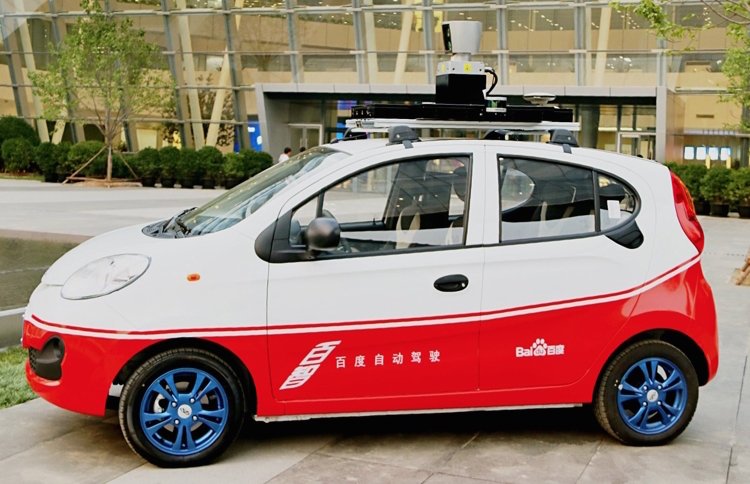Baidu, 30 other Chinese companies working on self-driving in Silicon Valley

The partnerships may be announced in Beijing, but they are the result of work that is happening 6,000 miles away in Silicon Valley, where Baidu and more than 30 other Chinese companies are busy developing and funding software and hardware to power internet-connected, autonomous vehicles.
The goal is to get those vehicles on the roads in China, the world's biggest auto market. The hope is that the same technology, embedded in exported Chinese vehicles, can then conquer the United States.
Baidu Inc, known as China's Google, is playing a central role in that effort. Like Waymo, the self-driving arm of Google parent Alphabet Inc, Baidu is using what it has learned in mapping and artificial intelligence to design the software and systems necessary to make self-driving cars a reality.
Its project, unveiled in April, is named Apollo after NASA's moon-landing program. The name indicates the scale of Baidu's ambition, but also the difficulty of the project.
It is by no means clear that it will succeed in one of the most competitive parts of the technology industry. Chief scientist Andrew Ng and self-driving unit manager Jing Wang left earlier this year to form their own startups.
"The competition for talent is keen," Jingao Wang, the new head of Baidu's Silicon Valley self-driving team, said in an interview at its technology center in the shadow of NASA's Ames Research Center in Sunnyvale, California. "There is never enough."
Baidu has at least one advantage over Waymo, based just five miles away at the sprawling Googleplex in Mountain View. It now has a presence in the United States, whereas Alphabet has no footprint in China, after Google shuttered its website there in 2010 rather than bow to the government's internet censorship.

SILICON VALLEY DRAGONS
In 2011, Baidu was one of the first of the new generation of Chinese companies to set up a base in Silicon Valley, in order to tap the world's deepest tech talent pool. Since then, it has made itself the center of a "China network" of almost three dozen firms there, through investments, acquisitions and partnerships.
Over six years, Baidu has assembled a formidable 200-person tech team, recruiting from top U.S. universities and established leaders in the auto and tech industry, including Google, Facebook Inc and Microsoft Corp.
It has expanded its technical capability through the acquisition of vision and robotics startup xPerception, a close partnership with chipmaker Nvidia Corp, and investments in other Silicon Valley firms such as Velodyne, an expert in lidar, the light-sensing technology key to letting self-driving cars "see" where they are going.
Baidu was followed by Tencent Holdings Ltd, China's largest internet company, which has bought its way into Silicon Valley, including a $1.8-billion investment earlier this year in Tesla Inc, the California electric car maker which is also working on self-driving technology.
Baidu and Tencent have teamed up to bankroll Nio, a startup aiming to put autonomous electric vehicles on American and Chinese roads by 2020, which is now valued at $2.8 billion.
Nio has its main offices in Shanghai and San Jose in Silicon Valley. Not far away, another Chinese-funded self-driving startup, Faraday Future, has a small team of engineers working from the U.S. office of sister company LeEco.
The money that Baidu and other Chinese investors have invested in Silicon Valley has driven up the value of mobility startups such as Zoox, said Evangelos Simoudis, a Palo Alto venture investor.
PIVOT TO AI
Chinese newcomers have now spread across the San Francisco Bay Area. Palo Alto, the birthplace of Silicon Valley, has emerged as a financial hub for China-connected venture capital firms such as GSR Ventures and ZhenFund.
In neighboring Menlo Park, the center of U.S. venture capital, China's largest automaker Shanghai Automotive Industry Corp has a tech center that houses the state-owned company's investment arm. China-backed Lucid Motors, a self-driving electric vehicle startup, also makes its home in Menlo Park.
"It takes the whole industry to make self-driving become real, instead of one company," said Amy Gu, managing partner of Hemi Ventures, a Silicon Valley venture capital firm that invests in autonomous vehicle startups. "It is not only about spending money, but about being able to come up with real products for which customers will pay."
It is not clear how quickly - if at all - Baidu will get to the point of producing such a product.
The company is struggling with a decline in its core advertising business, hurt by government curbs on medical ads in China and some unsuccessful side ventures. It is now looking to shift its focus to artificial intelligence under the guidance of Qi Lu, a former Microsoft executive. Self-driving is a key application of that.
Baidu has not specified how it intends to make money from the open-source Apollo project, but it has said it will integrate cloud-based data services into the platform, much as Google has done with its ubiquitous Android smartphone operating system.
The company may fill in some details at a developer conference it has scheduled for July 5 in Beijing, when it releases some Apollo technology for cars driving on urban streets and will announce its first manufacturing partners.
That could be a turning point when the technology focus will begin to shift from California to China, according to Simoudis.
"The dependence on Silicon Valley talent may not be eliminated, but it will continue to diminish as the Chinese build their own capabilities," he said.
Related News
